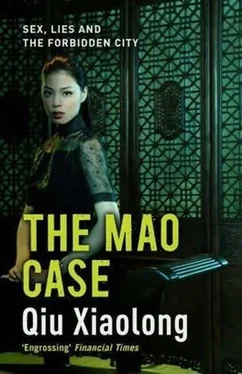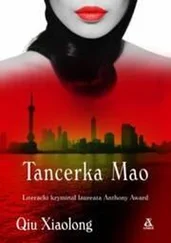According to Sima Yun, the head of the group, they were responsible to a “leading comrade” in Beijing, who was working in collaboration with the CCPC Cultural Revolution Group. They were instructed to deal with Shang in whatever way necessary to make her give up something important, possibly related to Mao, which had never been defined or explained to them. So they resorted to beating and torturing her. Shang said that Chairman Mao, had he known, wouldn’t have allowed them to do so. Sima told her that Madam Mao knew, and that was as good as from Mao himself. After that, Shang never said anything about Mao until her suicide. The team was summoned back to Beijing, bringing with them whatever they had found, including several albums.
It confirmed a couple of points on the case that Chen had speculated about.
First, the special team hadn’t been sent directly by Madam Mao, but by someone else. No name was given, but the “leading comrade” wasn’t she, who was only “in collaboration.”
Second, the special team itself wasn’t clear about what to extort from Shang. Except that the Party’s interests were at stake – some Mao material. So they interrogated Shang the hard way.
Rubbing the ridge of his nose, Chen checked another report in the folder, written on a somewhat smaller paper, possibly by another member of the team. To his astonishment, it was written at a much later date – as late as the end of 1974.
Apparently, Beijing remained concerned about the Mao material. In 1974, the year when Tan and Qian were caught in their attempt to flee across the border, some of the original special team members were summoned back to find more information. So the young lovers were brutally interrogated. It was suspected that they intended to smuggle something out, which also was not defined.
According to the statement made by Tan, the pair tried to go to Hong Kong because they saw no future in the mainland. He took all the responsibility. Because of his death, the investigation came to an abrupt end, even though an interview list had been made by the local committee concerning the close contacts of Tan and Qian.
Chen was about to read the last page in the folder when he was startled by an apparition, a grizzled man shuffling over from the far end of the garden, green canvas satchel slung across his shoulder. He checked around, picking up a fallen leaf with his free hand, and putting it into the satchel. He didn’t appear to be a gardener, nor did the satchel look like a proper tool. Chen hastened to put the book and the folder back into the large envelope.
“Who are you?” the gray-haired man demanded with an air of authority. “How did you get in here today?”
“I’m Chen. I’ve always dreamed of coming here – ever since childhood,” Chen said. “A friend of mine works here, so she let me in.”
“So you’ve come to pay homage to Mao? That’s the spirit, young man. People still worship him today, I know. Oh, I’m Bi. I served as Chairman Mao’s bodyguard for twenty years.”
“Oh, it’s a great honor to meet you, Comrade Bi.”
“I’m retired, but I still come here from time to time. Oh, those un-forgettable years by the side of our great leader! He built a socialist new China out of a poor, backward country. Without Chairman Mao, without China.”
Without Chairman Mao, without China? Chen didn’t ask. It sounded like a much-chanted line from a popular song in the sixties, except that it was a statement then, not a question.
“What a great man!” Bi went on in an emotional voice. “During three years of natural disasters, Mao refused to eat any meat.”
“Yes, millions of people died of starvation under the Three Red Flags those years,” Chen blurted out. The so-called “three years of natural disasters” was but a way to shift the blame for the disaster caused by Mao’s political campaign. In a different version of events, Chen had been told that Mao made a public show of eating no meat while still enjoying fish and wild game, some of them live, directly from the Central South Sea. At least Mao never starved in the Forbidden City.
“No, you can’t talk about history like that, young man. China was surrounded and sabotaged by imperialists and revisionists then. It was Chairman Mao that led us out of the woods.”
That was the official version. Chen knew it would be pointless to argue with Bi, an old man who had spent years by the side of Mao. Chen decided to sing a different tune.
“You’re right, Comrade Bi. I’ve just visited Mao’s bedroom. So simple, not even a soft mattress on the bed. It embodies our Party’s fine tradition of hard work, simple living. Indeed, few had the privilege of working with Mao. You, too, have made a contribution to China.”
“Working under Mao, I should say,” Bi said with a toothless grin. “Now, I’m just curious. In his bedroom, there’s such a large bed, covered with books. But almost nothing else. Did Madam Mao live here?”
“No, she didn’t.”
Chen didn’t push. Instead, he produced a cigarette, lit it respectfully for Bi, and waited.
“Madam Mao’s a curse,” Bi said, exhaling loudly.
Another officially approved statement. In the Party newspapers, the Cultural Revolution had been attributed to the Gang of Four, headed by Madam Mao.
“So Mao lived here all by himself?” Chen probed cautiously. “You know what? Mao had long been estranged from her. If she wanted to see him, she had to make an appointment, speaking to me first.”
“Oh, Mao must have trusted you so much.”
“Yes, we stopped her several times. She tried to break in, but Mao gave us instructions that no one could barge in without reporting to us first.”
That was unusual between a husband and wife. Bi didn’t say why, but it echoed what Chen had just read in the memoir. A guard wouldn’t have had the guts to stop Madam Mao, unless specifically instructed by Mao for a reason.
Instead of moving on to an elaboration of the unspoken reason, Bi leaned down, grinding out the cigarette on a slab of rock and putting the butt into the satchel.
“I have to make my rounds. It’s not easy for you to be let in. Stay here as long as you want. You’ll be able to bathe in the greatness of Chairman Mao.”
Bi shuffled away, humming a song to himself. “Red is the east, and rises the sun. China produces Mao Zedong, a great savior who works for happiness of the people.”
It was a tune that Chinese people would sing every day during the Cultural Revolution. And that the big clock atop the Custom House on the Bund played every hour. Watching Bi’s retreating figure against the deserted garden, Chen thought of a Tang-dynasty poem titled “The Outside Palace.”
In the deserted ancient outside palace,
the flowers bloom
into a blaze
of solitary, scarlet splendor.
Those palace ladies long left behind
there, white-haired,
sit and talk in idleness
about Emperor Xuan.
For a moment, Chen found himself confounded. He was no politician. Nor a historian. Nor a poet any longer, according to Ling, but a cop who did not even know what to do here.
The blue jay flapped by again, its wings still shiny like in a lost dream. The sudden ringing of his cell phone broke into his confusion. It was Detective Yu from Shanghai.
“I had to call you, Chief. Old Hunter gave me your temporary cell number – wherever you are. Song was killed.”
“What?” Chen stood up.
“I don’t know the details of his death except that he was attacked on a side street.”
“Attacked on a side street – by whom?”
“Internal Security will say nothing. But from what I’ve heard, it is possible he was mugged by gangsters. The fatal blow against his skull was made by something like a heavy metal bar.”
Читать дальше












